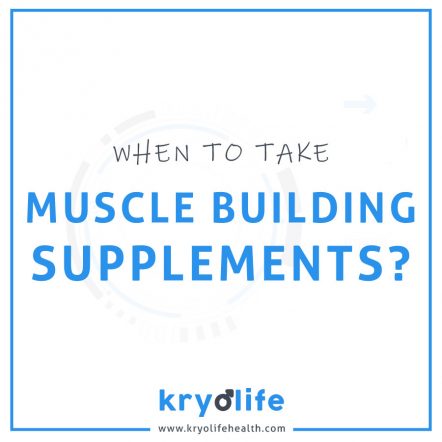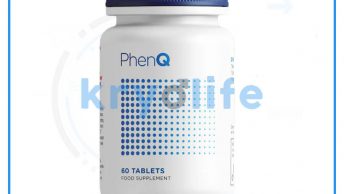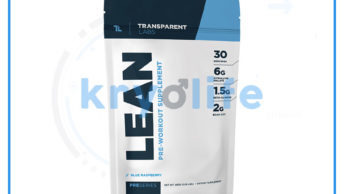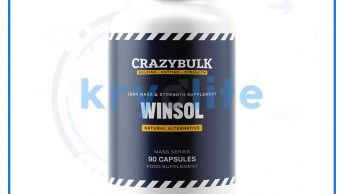Quick summary
- Bodybuilding supplements are a billion-dollar industry and their popularity is expected to grow further due to the increasing fitness concerns of millennials.
- The timing of supplement intake is as important as choosing the right brand because the body has a specific pattern of nutrient absorption from the gut, which can be synchronized with physical exertion caused by exercise for maximum benefit.
- Different supplements should be taken at different times throughout the day, such as taking whey protein in the morning, loading instant energy boosters one hour before a workout, and loading protein, BCAA, creatine, and beta-alanine 30 minutes before a workout.
- Bedtime supplementation is a crucial time to supply the body with protein as it repairs and grows muscles during sleep. Casein protein is a good option for this purpose.
Bodybuilding supplements are a billion-dollar industry that generates around $30bn every year in revenue.
This triumph is expected to go high in the following years and all thanks to the growing fitness concern of millennials.
One common downside of bodybuilding supplements is their inconsistency or the variation of results from individual to individual.
It’s true that individual physiology is a contributing factor that decides the results, but how can one deny that fact that proteins that help to build muscle1 in one person didn’t do anything to another one?
This is where we need to look deep into supplements and their mode of use.
Here you would discover one factor that is as important as choosing the best brand.
Timing of supplement intake is what we are up to, and this one factor can bring in a lot of influence on the result.
In this article, we will answer one of the commonly asked questions:
When should I use muscle building supplements?
Let us cut the intro here and move into little science that might help you get some insight.
Read more: 7 Biggest Muscle Building Myths
What are some of the major muscle building supplements?
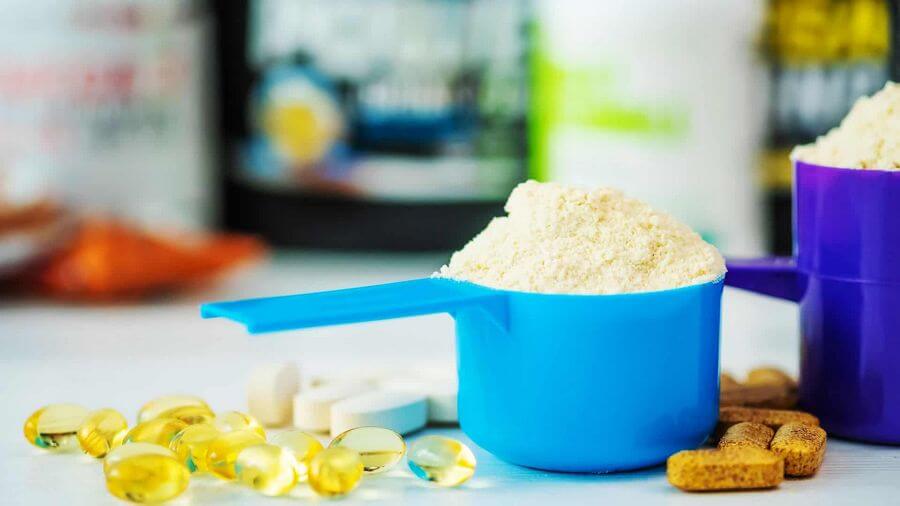
Before talking anything about supplement timing, one must know more about types of supplements been used by the bodybuilders and athletes.
- Creatine: Supplies the ATP for muscles, which is probably the best supplement for meeting immediate energy demand2.
- Protein: There are various grades and types of protein supplements, and all of them are supposed to supply all kinds of amino acids necessary for muscle building, repair, recovery, and strength3.
- Weight gainers: They are often a combination of carbs and protein with other micro-nutrients meant for faster muscle gains. People who are struggling to find enough calories from their daily diet can use weight gainers.
- Beta-Alanine: It’s an amino acid that stands out from the protein family because of its role in reducing fatigue and muscle-building properties4 .
- BCAA: ‘Branched-chain amino acids’ are a combination of 3 amino acids, namely valine, leucine, and isoleucine, which is very important in role muscle growth5.
- HMB: ‘Beta-hydroxy beta-methyl butyrate’ is a metabolic by-product when processing leucine in the body and helps in slowing down the muscle protein breakdown.
- Omega-3-fatty acids: It is a fatty found abundantly in the fishes and nuts which are essential for reducing muscle soreness post-workout.
Why is the timing very important for supplementation?

The body has a specific pattern in absorbing nutrients from the gut.
Some nutrients take longer to get absorbed, while some are absorbed within minutes of consumption.
For example, whey protein can get absorbed into the body within 30 minutes, and it takes just 1.5 hours get digested after consumption, whereas some micronutrients would take days.
In the context of bodybuilding, the physical exertion caused by exercise is a crucial factor that can be synchronized with the nutrient absorption pattern for maximum benefit.
For example, muscle protein synthesis can effectively happen in the body if you ingest the supplement post-workout instead of taking it before your exercise session.
Some nutrients might take hours to show up in your bloodstream to provide you with any benefits, like creatine, which needs to be taken at least 45 minutes before, workout to get full advantage.
In the post-workout session, your body will be starving and needs certain nutrients on demand for an active recovery and muscle building, all this might explain why supplement intake is highly influenced by the timing.
When should I use muscle building supplements?

For the sake of simplicity, let us divide the timings and assign supplementation based on the parts of a day.
1. When you wake up
As soon as you wake up, your body has finished fasting for 7~ 9 hours, which means by then, the stored reserves might have possibly depleted.
Thus, digesting protein will be the next move, which can be prevented by supplementing little whey protein in the morning.
A single scoop shake with some fruits will do enough to keep your muscles safe, and adding BCAA will further stop the muscle catabolism.
Having something caffeinated in the morning will give you a good start, but instead of coffee, try a caffeine pill that will do a much better job than coffee.
2. For your breakfast
This happens after 1 ~ 1.5 hours after you have woken. Breakfast can be anything that provides you balanced macronutrients.
A whole meal carrying eggs, oats, some meat, etc. is a good choice. Also, this is the best window to load some micronutrients into your system, which takes the longest time to get absorbed.
For this, you must define your mineral and vitamin requirements, which could vary depending on gender, workout, location, etc.
Some of the sure shots that you need to include are Vitamin B complex, Vitamin C, D, and E.
Calcium can also be included in the breakfast along with fish oil (which can provide some omega-3-fatty acid.)
3. Mid-day meal
Oily snacks or pastry is what most would prefer for their mid-day meal, and this could mess with your entire dietary balance.
Green tea, on the other hand, is an excellent choice for a mid-day meal, which is nothing short of a wonder.
They contain polyphenols, which helps in the fat burning process and can also speed up joint & muscle recovery.
However, this effect is not fully utilized because of the sloppy absorption of polyphenols by our body.
4. For lunch
Lunch for the majority of us might be a tough call because of the time constraints, and some would often miss it.
Mostly a quick bite is what you’ll prefer or something pleasing your taste buds from the nearby local restaurants.
Well, whatever you have, let it into your system, and the dietary modification can be done on the following meals to make up for the shortcomings, if any.
However, 2-3 gm of fish oil 30 minutes prior to your lunchtime will do good.
5. Pre-workout
This is when you prep your body for a strenuous workout session, and the primary focus is on loading instant energy and stamina boosters.
One hour before the workout is the apt time for loading stimulants.
Fat burning and muscle development have to happen side-by-side for a well-defined physique.
Caffeine, green tea, and NO boosters are some of the choices.
But if you are lazy loading multiple items, there are pre-workout supplements that either carry one of these stimulants or a combination of many.
Also, apart from stimulants, a pre-workout phase can be used for loading protein, BCAA, creatine, and Beta-Alanine to fuel your muscles.
This has to be done at least 30 minutes before the workout starts.
6. Post-workout
Post-workout is the best time for loading some whey protein, casein protein, creatine, BCAA, carbs, and beta-alanine.
Once you have finished the workout, you will get 45 minutes to feed your muscles, and this time window is very crucial.
During a workout, you would burn a good amount of glycogen from your body, and carbs have to reach your system as soon as possible to prevent muscle catabolism.
Casein is there to take care of your extended protein requirement since it is a slow-digesting protein.
7. Dinner
Make your dinner light and try to add as many micronutrients as possible.
During the workout, you have exhausted your mineral and vitamin reservoir a lot, and muscle repair needs micronutrients for efficient working.
Vitamin C, calcium, and vitamin D can be supplemented in your dinner, or you can have some fruits or veggies rich in nutrients mentioned above.
8. Bedtime supplementation
This is a bit unusual time to eat food, but studies say otherwise.
It is when you sleep, your body actually repairs and grow the muscles. During this time body dedicates its machinery for nutrients allocation and muscle repairs.
When asleep, if there is some source of protein in your body, that would benefit the muscle-building/repairing process.
You can use casein protein for this purpose, and using a single scoop would be enough to sustain muscle building for the entire night.
Conclusion
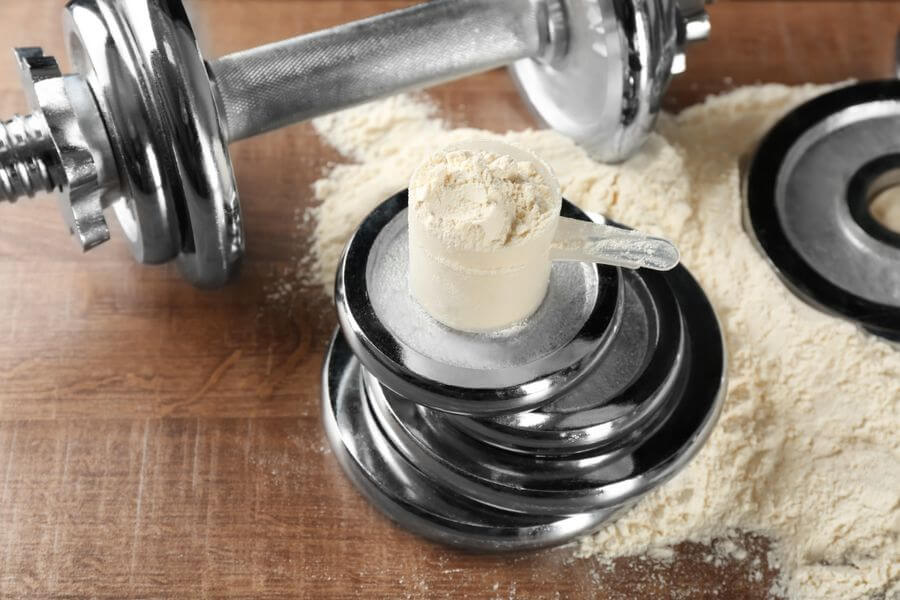
Above mentioned supplement timing is just a vague picture of how the nutrients should be supplied to juice the best out of it.
This schedule might be a useful reference for beginners and intermediates, but once you reach the top level of bodybuilding, you will have a lot of room to tweak the supplement timing.
After all to make a custom diet plan, you need to know what body needs and how nutrients behave inside the body.
This will help you devise a custom diet plan that will be much more effective than a general one.
Still, the basic understanding remains the same; the body needs lots of protein, a decent amount of carbohydrate, fat, and a little more than RDA for micronutrients (since an athlete depletes the levels faster).
Also, creatine, caffeine, fish oil, etc. plays a crucial role in preparing the body, which should be taken an hour before the workout.
So with this knowledge, you can try ‘timed supplementation’ for a better impact.
References
- Clarkson, Priscilla M., and Eric S. Rawson. “Nutritional supplements to increase muscle mass.” Critical reviews in food science and nutrition 39.4 (1999): 317-328. https://www.tandfonline.com/doi/abs/10.1080/10408699991279196
- Harris, Roger C., Karin Söderlund, and Eric Hultman. “Elevation of creatine in resting and exercised muscle of normal subjects by creatine supplementation.” Clinical science 83.3 (1992): 367-374. https://portlandpress.com/clinsci/article-abstract/83/3/367/75945
- Tipton, Kevin D., et al. “Stimulation of net muscle protein synthesis by whey protein ingestion before and after exercise.” American Journal of Physiology-Endocrinology and Metabolism 292.1 (2007): E71-E76. https://www.physiology.org/doi/full/10.1152/ajpendo.00166.2006
- Artioli, Guilherme Giannini, et al. “Role of beta-alanine supplementation on muscle carnosine and exercise performance.” Med Sci Sports Exerc 42.6 (2010): 1162-1173. http://www.academia.edu/download/43844955/The_Role_of_-alanine_Supplementation_on_20160317-20037-pvj2h0.pdf
- Shimomura, Yoshiharu, et al. “Exercise promotes BCAA catabolism: effects of BCAA supplementation on skeletal muscle during exercise.” The Journal of nutrition 134.6 (2004): 1583S-1587S. https://academic.oup.com/jn/article-abstract/134/6/1583S/4688850

